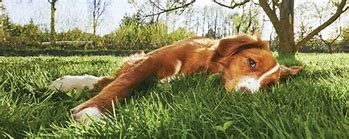Myths On Pets Health By Pierre Mouchette | Bits-n-Pieces Dogs should lick wounds to heal them.
Stopping dogs from pulling out their stitches is only part of why they must wear a cone after surgery. Licking wounds slows the healing process! Dogs do not have clean mouths, and saliva can introduce new infections into the wound. The constant licking in the wound area can irritate the wound, further slowing down healing. A warm, dry nose means your dog is sick. A dog’s nose temperature or moisture level does not indicate systemic health. Certain conditions can cause the nose to dry abnormally, but these are almost always associated with cracking or sores on the nose. So why is your dog’s nose dry? It is probably a reflection of the temperature and humidity in your home or your area. Similarly, your skin and dog's nose can dehydrate in certain conditions. Dogs’ paw pads are heat resistant. It is the opposite. A dog’s paw pads are susceptible to hot and cold and should be protected in extreme temperatures. Consider walking your dog in the grass or shaded sidewalks on hot days. It would help if you also considered using booties on your dog’s feet during cold winter walks. Grain-free diets are healthy and natural. Some people believe that domestic dogs should eat more like their wild ancestors, raw meat only. However, domestic dogs have evolved throughout human-dog relationships to eat more like humans. Some dogs have allergies or sensitivities and can benefit from a grain-free diet, but this is relatively uncommon. While protein should comprise most of a dog’s diet, grains can add beneficial fiber, vitamins, and minerals. In other words, grains are not just fillers in your pet’s food product. Note: Gain-free diets exploded when grain-free eating was popular among humans. It is more of a fad diet than a scientific guideline. Research shows that grain-free diets can be detrimental to heart function. There is less research available about grain-free diets and cat health, but currently, there is no evidence that a grain-free diet is healthier for your cat than the traditional diet. Indoor cats do not need vaccines. Although an indoor cat does not need all the vaccines that an outdoor cat does, that does not mean an indoor cat cannot benefit from any vaccines. At the very least, your indoor cat needs a rabies vaccine. In addition to the rabies vaccine, the FVRCP vaccine, commonly known as the feline distemper vaccine, is most important for cats. It is because this disease can be carried into your home via your clothes or shoes. Note: In many areas, rabies vaccines are required by law. Not having a rabies vaccine can result in fines or even having your cat put down. Cats clean themselves and need little maintenance, Cats have a reputation for being low maintenance, which is somewhat true compared to other animals. But there is one area of your cat’s hygiene that you may want to place on your radar, cat dental disease, a most common disease in cats. Most of us do not think to brush our cat’s teeth, but they need regular dental care just as we do. Most cats over the age of 3 have gingivitis or periodontal disease and can benefit from regular oral health care. A common saying about pet health is trustworthy: If your cat or dog is acting different or strange, it is a good indicator that something is wrong and a valid reason to consult your veterinarian.
0 Comments
Your comment will be posted after it is approved.
Leave a Reply. |
Archives
May 2024
|
